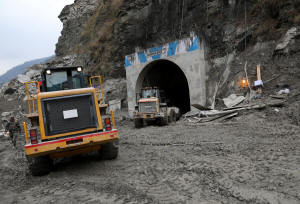|
Some 204 people remain unaccounted for since Sunday's disaster
in Uttarakhand state, most of them workers at the Tapovan
Vishnugad hydroelectric project and at the smaller Rishiganga
dam, which was swept away by the torrent.
At the Tapovan tunnel's entrance, anxious relatives lingered in
heavy rain, desperate for word on whether anyone had been found.
"We don't know what else to do," said Deepa Chauhan the sister
of 30-year-old Patminder Bisht, a supervisor among the workers
at the site.
A drone with five cameras was sent inside a short stretch of the
tunnel for a second day on Wednesday, but found no-one, either
alive or dead, an official said.
So far, police say, 32 bodies have been retrieved from the
Himalayan mountainsides or pulled out of the Dhauliganga river
further downstream.
As the hours passed in the winter cold, there was a mounting
risk hypothermia could kill anyone in the tunnel who had
survived, said Vivek Pandey, a spokesman for the Indo-Tibetan
Border Police, a paramilitary force involved in the rescue
effort.
Excavators had cleared more than 80 metres of mud blocking the
tunnel entrance, but still have at least another 80 metres to go
to reach where most of the workers were believed to be trapped,
officials at the site said.
Giant boulders were blocking progress.
"Sediment and water has entered the tunnel and we are unable to
clear it," a government official monitoring the situation from
New Delhi told Reuters.
Elsewhere in the valley, helicopters dropped food parcels and
villagers set up a zip wire across the river to deliver supplies
to some of the 13 mountain villages cut off by the disaster.
A team of scientists have reached the glacier site to determine
what triggered a calamity, which fuelled concern about the
building of hydropower projects in the ecologically sensitive
mountains.
The flash flood was initially thought to have been caused by a
glacier breaking apart and crashing into the river, but some
scientists now say it was more likely to have been due to an
avalanche.
(Additional reporting by Saurabh Sharma in Lucknow; Writing by
Sanjeev Miglani; Editing by Simon Cameron-Moore)
[© 2021 Thomson Reuters. All rights
reserved.] Copyright 2021 Reuters. All rights reserved. This material may not be published,
broadcast, rewritten or redistributed.
Thompson Reuters is solely responsible for this content.

|
|




